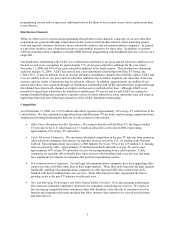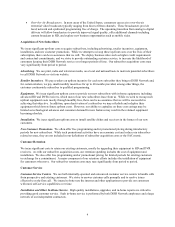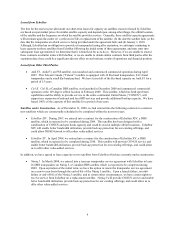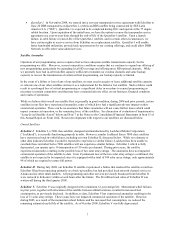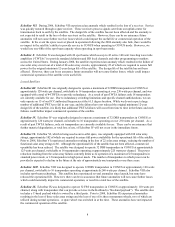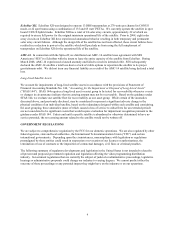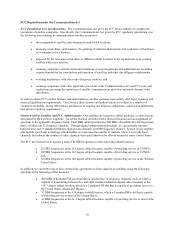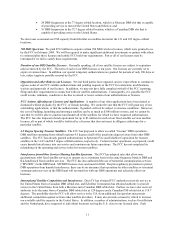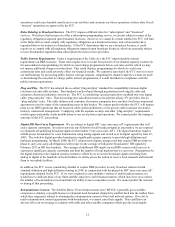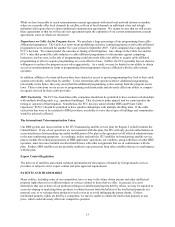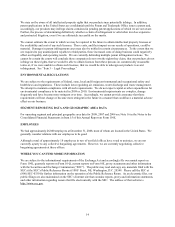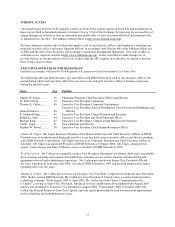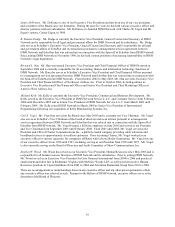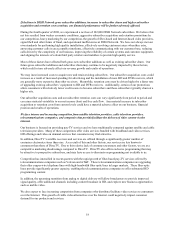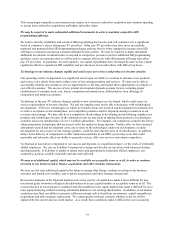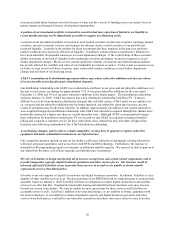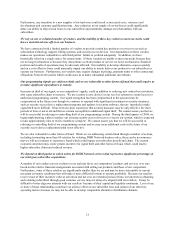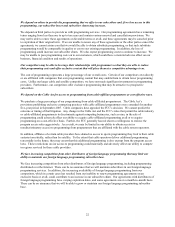Dish Network 2008 Annual Report Download - page 22
Download and view the complete annual report
Please find page 22 of the 2008 Dish Network annual report below. You can navigate through the pages in the report by either clicking on the pages listed below, or by using the keyword search tool below to find specific information within the annual report.
12
operations could cause harmful interference to our satellites and constrain our future operations at those slots if such
“tweener” operations are approved by the FCC.
Rules Relating to Broadcast Services. The FCC imposes different rules for “subscription” and “broadcast”
services. We believe that because we offer a subscription programming service, we are not subject to many of the
regulatory obligations imposed upon broadcast licensees. However, we cannot be certain whether the FCC will find
in the future that we must comply with regulatory obligations as a broadcast licensee, and certain parties have
requested that we be treated as a broadcaster. If the FCC determines that we are a broadcast licensee, it could
require us to comply with all regulatory obligations imposed upon broadcast licensees, which are generally subject
to more burdensome regulation than subscription television service providers.
Public Interest Requirements. Under a requirement of the Cable Act, the FCC imposed public interest
requirements on DBS licensees. These rules require us to set aside four percent of our channel capacity exclusively
for noncommercial programming for which we must charge programmers below-cost rates and for which we may
not impose additional charges on subscribers. This could displace programming for which we could earn
commercial rates and could adversely affect our financial results. We cannot be sure that if the FCC were to review
our methodology for processing public interest carriage requests, computing the channel capacity we must set aside
or determining the rates that we charge public interest programmers, it would find them in compliance with the
public interest requirements.
Plug and Play. The FCC has adopted the so-called “plug and play” standard for compatibility between digital
television sets and cable systems. That standard was developed through negotiations involving the cable and
consumer electronics industries, but not us. The FCC is considering various proposals to establish two-way digital
cable “plug and play” rules. That proceeding also asks about means to incorporate all pay-TV providers into its
“plug and play” rules. The cable industry and consumer electronics companies have reached a tru2way commercial
agreement to resolve many of the outstanding issues in this docket. We cannot predict whether the FCC will impose
rules on our DBS operations that are based on cable system architecture or the private cable/consumer electronics
tru2way commercial arrangement. Complying with the separate security and other “plug and play” requirements
would require potentially costly modifications to our set-top boxes and operations. We cannot predict the timing or
outcome of this FCC proceeding.
Digital HD Must Carry Requirement. We are subject to digital HD “carry-one-carry-all” requirements that will
cause capacity constraints. In order to provide any full-power local broadcast signal in any market, we are required
to retransmit all qualifying broadcast signals in that market (“carry-one-carry-all”). The digital transition requires
all full-power broadcasters to cease transmission using analog signals and switch over to digital signals by June 12,
2009. The switch to digital provides broadcasters significantly greater capacity to provide high definition and
multicast programming. In March 2008, the FCC adopted new digital carriage rules that require DBS providers to
phase in carry-one-carry-all obligations with respect to the carriage of full-power broadcasters’ HD signals by
February 2013 in HD local markets. The carriage of additional HD signals on our DBS system could cause us to
experience significant capacity constraints and limit the number of local markets that we can serve. Preparations for
the digital transition also required resource-intensive efforts by us to convert broadcast signals switching from
analog to digital at the hundreds of local facilities we utilize across the nation to receive local channels and transmit
them to our uplink facilities.
In addition, the FCC is now considering whether to require DBS providers to carry broadcast stations in both
standard definition and high definition starting in 2010, in conjunction with the phased-in HD “carry-one-carry-all”
requirements adopted by the FCC. If we were required to carry multiple versions of each broadcast station, we
would have to dedicate more of our finite satellite capacity to each broadcast station, which may force us to reduce
the number of local markets served and limit our ability to meet competitive needs. We cannot predict the outcome
or timing of that proceeding.
Retransmission Consent. The Satellite Home Viewer Improvement Act (“SHVIA”) generally gives satellite
companies a statutory copyright license to retransmit local broadcast channels by satellite back into the market from
which they originated, subject to obtaining the retransmission consent of the local network station. If we fail to
reach retransmission consent agreements with broadcasters, we cannot carry their signals. This could have an
adverse effect on our strategy to compete with cable and other satellite companies which provide local signals.



